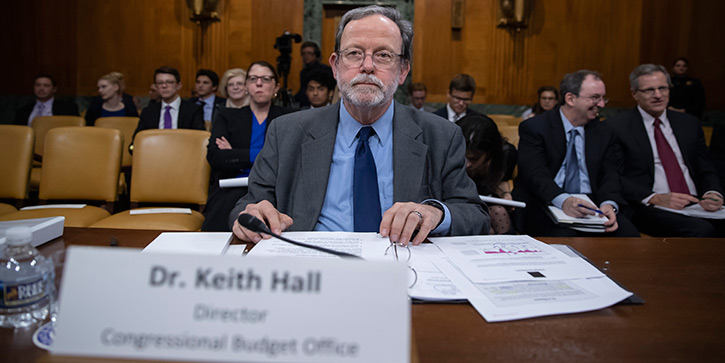
A Balanced Budget
-
 Jared Dillian
Jared Dillian
- |
- February 14, 2019
- |
- Comments
The Green New Deal is silly and isn’t worthy of our attention. The broader point it makes—that we can have anything we want if the Federal Reserve extends credit—is.
Let me blow your hair back for a second. The two biggest stock market rallies in the history of our stock market (in the 1920s and in 1990) occurred against a backdrop where the budget deficit was disappearing or had disappeared.
Calvin Coolidge is perhaps the second-least well-understood president of the 20th century (behind only Warren Harding). I’ll give you the abridged version: Coolidge was perhaps the biggest CF known to mankind. He ran the country like he ran a household budget. Talk about austerity—wow.
I worked for the government under the Clinton administration. Clinton was not well-liked by government employees. He kept telling people to “do more with less.” No money for trips, no money for projects, no money for boondoggles.
Go look at the budget figures from the 1990s—the size of government remained pretty constant, which is something. It was the closest thing we’ve had to austerity in nearly 70 years. The drunken spending spree, replete with new government bureaucracies and multiple wars, was kicked off by 9/11.
(In hindsight, it should not have come as a surprise that stocks went straight up in the 90s. Free trade, peace breaking out all over, balanced budgets, innovation—really an amazing time to be alive. And people were miserable.)
Do you think it is an accident that the two biggest bull markets roughly correspond with government austerity? I do not.
Today, the opposite is happening. In the 2000s, Dick Cheney said that deficits didn’t matter, but at least he was constrained by the bond market. I suppose that if MMT were implemented, foreign exchange markets would have their say about it (provided we still had floating exchange rates).
Don’t you think it’s weird that the government can spend as much money as it wants, but you can’t? That the government gets to play by a different set of rules?
|
Household Budgets
Regardless of how much money the Fed prints, what they do with their balance sheet, or how many railroads across the Pacific we build, you are faced with the harsh reality of having to spend less money than you make. You can temporarily make up a shortfall with debt (just like the government), but after a while, your creditors get sick of you and the gig is up.
It is kind of hard to tell people to mind their personal finances while the government is going bananas. But that is what we do. We tell people to eliminate debt and manage risk, and part of the reason we tell people that is because people have to manage the stupidity of governments.
In civilizations modern and ancient, governments have found the temptation irresistible to borrow and spend and mess with the value of their currency. If you happen to be a resident of one of those countries, then you will get mowed over as an innocent bystander.
Unless you take measures to protect yourself.
This isn’t a precious metals newsletter, but the way you protect yourself from plans to demolish every house and kill all the cows is… gold.
Like what you're reading?
Get this free newsletter in your inbox every Thursday! Read our privacy policy here.
Interestingly enough, in 2009-2011, people thought it was really important to own that stuff (because of QE). I was one of those people. It didn’t cause inflation, unless you think it works with a really long lag.
The stuff people are talking about now is way more radical than what was going on during the financial crisis.
I own a lot of gold, most of it from before the financial crisis. I have never been sorry about my decision (though I was a little stressed out when the drawdown got to 45% or so). You own it specifically for times like these. Crazy town.
|
Should I Own Physical Gold?
Don’t bother if you don’t have any assets to protect in the first place. The point is not to punt it around. I think that’s where people went wrong in the last big bull market—it was a punt, rather than a hedge.
And I don’t mean that it’s a hedge in the portfolio sense, as in gold goes up when other stuff goes down. I mean, physical gold is a hedge on your life. You have a tube of Eagles on your nightstand that you can put in your pocket and run to the airport with if things start getting kinky.
There are a lot of people who buy gold. They do so for a reason.
Some people say that gold doesn’t track inflation very well. But one thing it does well over time is maintain purchasing power, with some minor variations along the way.
I bet Venezuelans wish they had some gold. And guns!
That’s the most depressing thought in the world—that one day, we might need gold and guns in this country, like in some right-wing dystopian fiction. I hope not! Things usually work out for the best. But sometimes they don’t.
It’s dumb to have 100% of your portfolio in gold, but it’s also dumb to have 0% of your portfolio in gold.
This isn’t a market call on gold (though I am a bit bullish). It’s responsible to have a good chunk of bonds and it’s responsible to have a little bit in gold. It’s irresponsible to have it all in the QQQ.
P.S. Three Things You Should Know About SIC 2019
If you’re thinking about going to the Strategic Investment Conference in Dallas in May, here are a couple of things I’ve learned from all the SICs I’ve gone to and spoken at:
- It’s pretty intense: It does wear you out a bit, intellectually speaking! Amazing speakers, terrific discussions in between sessions, countless chats. It is, as John Mauldin has said, like drinking information from a firehose. Last year, Neil Howe melted my brain. The year before, Matt Ridley was amazing. I’m expecting similar food for thought this year.
- Ideas, ideas everywhere: One of the great things about the SIC lineup is that different viewpoints are well-represented. So yes, there are some ideas there I don’t agree with, but all it takes is one good one to justify the price of admission (and there is always more than one—in fact, in The Daily Dirtnap, we just recently got out of a pretty good trade that I started developing at SIC 2018).
- You only have a few days left to get priority pricing: February 18 (Monday) is the very last day you can save $1,000 on the cost of your SIC ticket. Honestly, the cost of admission is more than worth it even at full price, but if you can save 1,000 bucks, why wouldn’t you?
Here’s the link to sign up and get that $1,000 discount. Hope to see you there.
subscribers@mauldineconomics.com

 Jared Dillian
Jared Dillian

